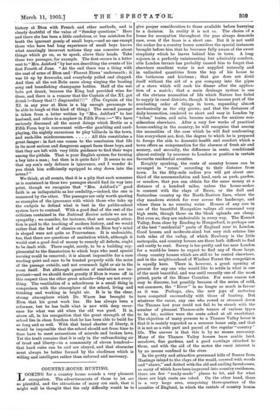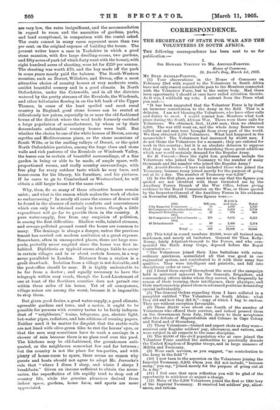L OOKING for a country house sounds a very pleasant occupation.
The advertisements of those to let are so plentiful, and the attractions of many are snob, that it might well be thought that the only difficulty would be to give proper consideration to those available before hurrying to a decision. In reality it is not so. The choice of a home for occupation throughout the year always demands care, even if the lease is a short one. But it is not until the seeker for a country house considers the special instances brought before him that he becomes fully aware of the sweet simplicity which he leaves behind him in town. A long sojourn in a perfectly uninteresting but admirably comfort. able London terrace has probably caused him to forget that elsewhere excellent water is not supplied naturally and in unlimited quantities from the top of his house to the bathroom and kitchens ; that gas does not distil itself without the aid of a gas company into the pipes of a stove which will cook his dinner after the applica- tion of a match; that a main drainage system is one of the obvious necessities of life which Nature has failed to supply in rural districts, though it has become part of the everlasting order of things in town, expanding almost mechanically as the city grows ; and that the distancea of daily locomotion, rendered so short and easy in London by " tubes," trains, and cabs, become matters for anxious con- sideration elsewhere. After a very few weeks of practical house-seeking in the country, he will recognise that among the necessities of the case which be will find confronting him everywhere are, first, the degree to which he is prepared to forego the aids to domestic health and comfort which a town offers as compensation for the absence of fresh air and scenery, and secondly, the difference in rents, conditioned almost entirely by nearness to London or position in certain favourite residential counties.
Roughly speaking, the rents of country houses can be arranged in " zones," according to their distance from town. In the fifty-mile radius you will get about one- third of the accommodation and land, such as park, garden, or meadow, that you can obtain for the same money at a distance of a hundred miles, unless the house-seeker is content with the clays of Essex, or the dull and featureless country up the North-Eastern lines, where the clay meadows stretch for ever across the landscape, and where there is no running water. Houses of any size in one of the beautiful Hampshire valleys all command very high rents, though those on the bleak uplands are cheap. But even so, they are undesirable in every way. The Kennet Valley, from close by Reading to Hungerford, is perhaps one of the best "residential" parts of England near to London. Good houses and moderate-sized but very rich estates line both sides of the valley, of which Newbury is the little metropolis, and country houses are there both difficult to find and costly to rent. Surrey is too pretty and too near London for a would-be lessee to expect to find any of those large, cheap country houses which are still to be rented elsewhere, and in the neighbourhood of Windsor Forest the competition is equally keen. There is, however, a great opening at present for any one who would like to settle in what is one of the moat beautiful, and was until recently one of the most prized, parts of the Home Counties. For some reason not easy to discover, but possibly because of the series of cold, wet summers, the " River" is no longer so much in favour as it was. Perhaps, also, the new joys of motoring have competed successfully with those of boating. But whatever the cause, any one who rowed or steamed down the Thames last year could not fail to be struck with the number of pleasant Thames-side houses of various types to be let; neither were the rents asked at all exorbitant. The objection of many persons to a Thames Valley house is that it is mainly regarded as a summer home only, and that it is not as a rule part and parcel of the regular " country " life. The answer is that this is by no means necessary. Many of the Thames Valley houses have arable land, meadows, fine gardens, and a good curtilage attached to them, and with the aid of the motor the rural interest is by no means confined to the river.
In the pretty and attractive greensand hills of Sussex from Hastings inland to the clays of the weald, covered with woods and" shaws," and dotted with the old and smiling farmhouses, so many of which have been improved into country residences, there are few " ready-made " places to let, and for what there are high rents are asked. On the other hand, there is a very large area, comprising three-quarters of the counties of England, in which the rentals of country homes are very low, the rates insignificant, and the accommodation in regard to room and the amenities of gardens, parks, and land exceptional, in comparison with the rental asked. The rents cannot in many cases represent more than two per cent. on the original expense of building the house. The present writer knew a case in Yorkshire in which a good stone mansion, with five large dwelling-rooms, two gardens, and fifty acres of park (of which forty went with the house), with eight hundred acres of shooting, were let for £250 per annum. The shooting was worth £70, and the hay made off the park in some years nearly paid the balance. The South-Western counties, such as Dorset, Wiltshire, and Devon, offer a most attractive choice of country houses at very moderate rents, amidst beautiful scenery and in a good climate. In North Oxfordshire, under the Cotswolds, and in all the districts watered by the pretty streams of the Evenlode, the Windrush, and other tributaries flowing in on the left bank of the Upper Thames, in some of the least spoiled and most rural country in England, good stone houses can be rented at ridiculously low prices, especially in or near the old-fashioned towns of the district where the wool trade formerly enriched a large population of manufacturers, by whom or by their descendants substantial country homes were built. But whether the choice be one of the white houses of Devon, among myrtles and Mediterranean pines, or the stone mansions of South Wilts, or in the smiling valleys of Dorset, or the quiet North Oxfordshire parishes, among the huge elms and stone walls and rich pastures of the Evenlode or Windrush Valley, the lessee can be certain of beautiful surroundings, of a fine garden in being or able to be made, of ample space, well- proportioned rooms, and really country surroundings, with free play for every outdoor taste which he may have, and house-room for his library, his furniture, and his pictures. If he cares to go to Cumberland or Westmorland, he will obtain a still larger house for the same rent.
Why, then, do so many of these attractive homes remain unlet ; and what is the reason which makes the work of choice so embarrassing P In nearly all cases the causes of demur will be found in the absence of certain comforts and conveniences which can only be obtained easily in towns, though a little expenditure will go far to provide them in the country. A pure water-supply, free from any suspicion of pollution, is among the first difficulties. Shallow wells, tainted streams, and sewage-polluted ground round the house are common to many. The drainage is always a danger, unless the previous tenant has carried out modern sanitation at a great expense. Somewhere, often in unsuspected places, there are huge cess- pools, probably never emptied since the house was first in- habited. Diphtheria or typhoid seems always liable to occur in certain villages and in or about certain houses, in a way never paralleled in London. Distance from a station is a great drawback. Isolation from a village is not desirable, and the post-office should be near. It is highly undesirable to be far from a doctor ; and equally necessary to have the telegraph within easy reach, though the Lord-Lieutenant of one at least of the Southern counties does not permit one within three miles of his house. Yet of all annoyances, village noises are among the worst, because it is impossible to stop them.
But given good drains, a good water-supply, a good climate, agreeable gardens and trees, and a motor, it ought to be possible for persons with country tastes to be fairly indepen- dent of " neighbours," trains, telegrams, gas, electric light, hot-water pipes, radiators, and late editions of evening papers. Neither need it be matter for disquiet that the stable-walls are not lined with olive-green tiles to rest the horses' eyes, or that the men may sometimes have to wash a carriage in a shower of rain because there is no glass roof over the yard. The kitchens may be old-fashioned, the greenhouses anti- quated, or the neighbours somewhat few and far between ; but the country is not the place for tea-parties, and with plenty of house-room to spare, there seems no reason why guests and hosts should not agree to adopt Mr. Jorrocks's rule that " where I dines I sleep, and where I sleeps I breakfasts." Given an income sufficient to obtain the neces- saries, the superfluities of life rapidly tend to drop out of country life, while the genuine pleasures derived from indoor space, gardens, home farm, and sports are more appreciated.
publication :—











































 Previous page
Previous page